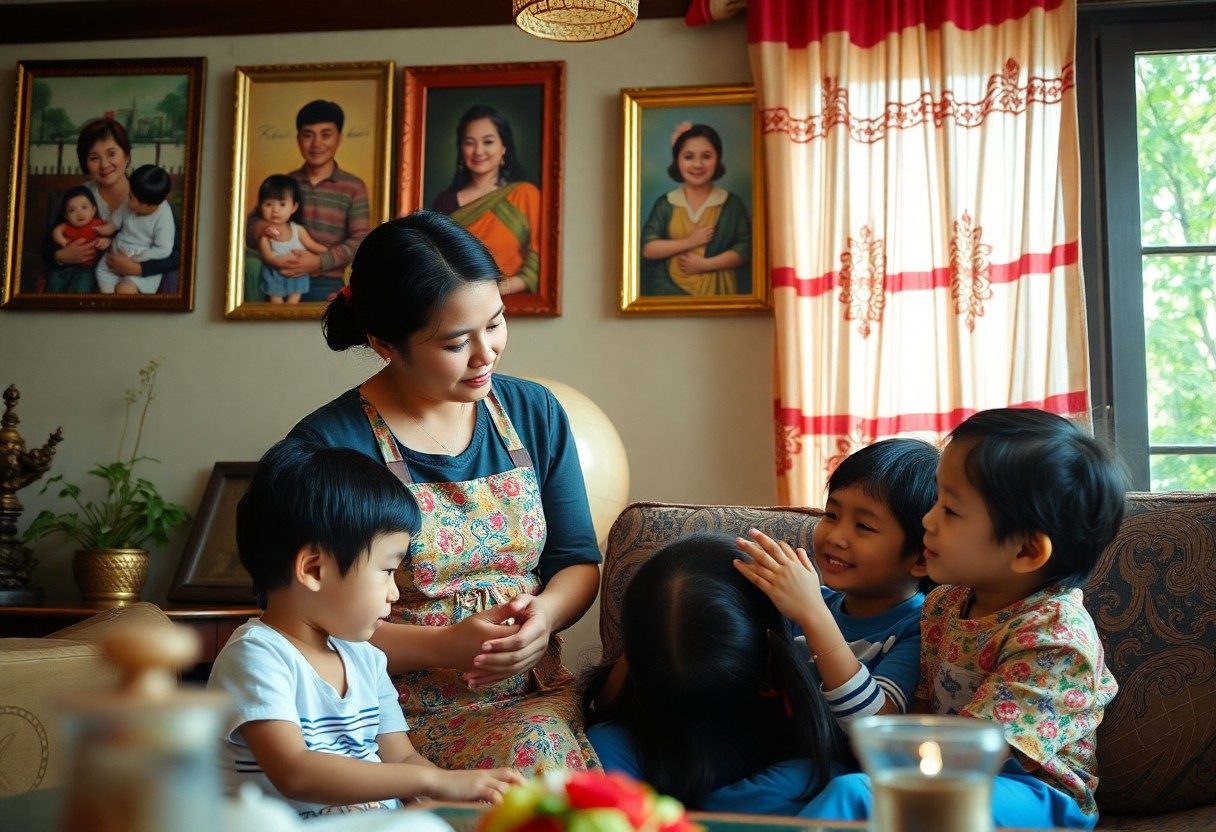Just like many caregivers, Filipino nannies bring unique cultural insights that can significantly enrich your family dynamic. With their strong emphasis on familial bonds, respect, and nurturing, they excel in creating a harmonious environment for children and parents alike. By understanding and appreciating their cultural background, you can foster a deeper connection and collaboration with them, allowing for a thriving household. This blog post will research into how Filipino nannies seamlessly embody and promote family values, enhancing the caregiving experience for everyone involved.
Key Takeaways:
- Filipino nannies prioritize strong family connections, emphasizing the importance of building trust and rapport with both the children they care for and their parents.
- Through cultural traditions and practices, Filipino nannies instill values such as respect, gratitude, and community support, creating a nurturing environment for children.
- They exhibit adaptability by blending their cultural norms with those of the families they work for, fostering an inclusive atmosphere that respects diverse backgrounds.
Understanding Cultural Sensitivity
To navigate the diverse landscape of childcare, particularly as a Filipino nanny, understanding cultural sensitivity is vital. It allows you to appreciate and honor the cultural backgrounds of the families you work with, fostering a harmonious environment.
Definition of Cultural Sensitivity
For you, cultural sensitivity means being aware of and respecting the differences in cultural practices, beliefs, and values that families may hold. It’s about acknowledging these differences and adapting your approach to childcare to meet varying needs.
Importance of Cultural Sensitivity in Childcare
On building strong relationships with the families you serve, cultural sensitivity plays a fundamental role. It helps you connect effectively with both children and parents, ensuring everyone feels valued and understood.
Sensitivity to cultural differences can encourage open communication, allowing you to address any concerns that parents may have regarding their children’s upbringing. By understanding their cultural framework, you can provide a nurturing environment that aligns with their values, ultimately enhancing the child’s development and family dynamics.
Key Principles of Cultural Sensitivity
Importance of cultural sensitivity lies in its key principles, which include awareness, respect, and adaptability. These principles guide your interactions and ensure that you contribute positively to a family’s unique cultural framework.
Understanding these principles involves actively seeking knowledge about different cultures, reflecting on your own cultural biases, and being open to diverse practices. This approach not only enriches your experience as a nanny but also supports the children in becoming more culturally aware and accepting individuals.
Filipino Culture and Family Values
Some of the most distinctive aspects of Filipino culture revolve around strong family bonds and values. You will find that family is at the core of everyday life in the Philippines, often extending beyond immediate relatives to include a vast network of aunts, uncles, cousins, and close family friends. These connections create a unique support system, where collective responsibility and unity shape your experiences.
Overview of Filipino Family Structures
Culture plays a significant role in defining family structures in the Philippines. Traditional family units consist of parents and their children, often living close to extended family members. This interconnectedness allows for shared resources and responsibilities, fostering a sense of belonging and security among family members.
The Role of Respect and Honor in Filipino Families
Overview of respect and honor highlights their importance in Filipino family dynamics. You will notice that respect for elders is deeply ingrained in cultural practices, with specific expressions of honor observed in daily interactions. This reverence creates a nurturing environment where each family member feels valued.
Families prioritize showing respect for their elders, forming a strong foundation for coexistence. This mindset fosters gratitude and encourages younger generations to appreciate their heritage and upbringing. You might also observe children learning to address older relatives with specific titles, reflecting the emphasis placed on maintaining familial hierarchy and connection.
Importance of Community and Support Systems
Against this backdrop of strong family values, you will see how important community and support systems are within Filipino culture. The networks that arise from relationships with neighbors, friends, and extended family often act as a lifeline during challenging times, ensuring that no one feels alone.
For instance, during times of need, you may find that families rally together, pooling resources to help one another. This spirit of solidarity not only reinforces your bond with your own family but also fosters a broader sense of community, where everyone plays a role in supporting each other’s well-being and progress.
The Role of Nannies in Filipino Households
Despite common perceptions, nannies in Filipino households play a multifaceted role beyond mere caretaking. They are often woven deeply into the fabric of family life, embodying cultural values and serving as a vital support system for working parents.
Historical Context of Nanny Employment in the Philippines
Between the colonial period and the present day, the profession of nannying has been influenced by socio-economic changes, shaping the expectations and perceptions surrounding caregivers. Historically, nannies often came from less privileged backgrounds and were seen as extensions of the family, balancing work and domestic life in homes across the Philippines.
The Evolving Role of Nannies in Modern Filipino Families
The role of nannies in contemporary Filipino families has transformed significantly, adapting to the needs of today’s fast-paced lifestyle. They are not just caregivers; they are also educators, nurturers, and even confidants, contributing to the emotional and social development of children.
Modern nannies often engage in educational activities and share cultural traditions, enriching children’s lives beyond basic care. Their role is increasingly seen as one of collaboration with parents, as they contribute to a child’s learning environment and emotional well-being. This evolution reflects a growing recognition of the importance of a holistic approach to childcare.
Contributions of Nannies to Family Dynamics
About family dynamics, nannies can significantly influence the relationships and overall harmony within a household. They often bridge the gap between parents’ busy schedules and children’s developmental needs, fostering stronger family bonds.
With their nurturing presence, nannies help create a loving and stable environment where children can thrive. This support not only alleviates stress for parents but also promotes a sense of community and shared responsibility, making it easier for families to navigate the challenges of daily life together.
Embracing Cultural Sensitivity as a Filipino Nanny
Keep culture at the forefront of your interactions as a Filipino nanny. Language and communication practices play a vital role in fostering relationships with both children and parents. Developing fluency in the family’s preferred language will help bridge potential gaps, while active listening and clear articulation of thoughts contribute to effective communication. Simple gestures, such as smiling and maintaining eye contact, can enhance your connection with the family.
Language and Communication Practices
Embracing the linguistic nuances of your host family’s culture not only aids in effective communication but also shows your respect and willingness to adapt to their environment. By picking up key phrases and expressions, you create a harmonious dialogue that builds trust and understanding.
Adapting Parenting Styles to Fit Family Values
Against the backdrop of diverse cultural values, adapting your parenting style to align with the family’s traditions is vital. You might find that certain practices resonate more deeply with the family’s beliefs, allowing you to become a more effective caregiver. Embracing flexibility and openness will enable you to navigate any differences comfortably.
And as you incorporate elements of your host family’s parenting style, you will not only gain their trust but also enhance the well-being of the children you care for. Being observant and willing to adjust your methods will create a more cohesive environment that reflects the values the family cherishes, ensuring the children’s growth and happiness.
Navigating Cultural Differences with Employers
With every family you work with, you will encounter different cultural norms and expectations. Recognizing and respecting these differences is crucial for a smooth working relationship. Engaging in open and respectful conversations with your employer allows you to better understand their values and routines.
At times, conflicts may arise due to misunderstandings rooted in cultural differences. Approaching these situations with empathy and a willingness to learn can transform challenges into opportunities for growth. Establishing a two-way dialogue fosters mutual respect, ensuring that both you and your employer can work together effectively for the well-being of the children.

Training and Preparation for Filipino Nannies
After a thorough selection process, Filipino nannies undergo extensive training and preparation to ensure they embody the family values that are crucial to your home environment. This preparation equips them to meet the diverse needs of families while respecting cultural differences.
Essential Skills for Cultural Sensitivity
The ability to communicate effectively across cultural lines is vital for Filipino nannies. They learn to navigate various family dynamics and understand different cultural practices, fostering an environment where all family members feel valued and accepted.
Educational Programs and Workshops
Skills development is a key part of training for Filipino nannies. This includes participation in educational programs and workshops designed to refine their caregiving abilities and enhance their understanding of cultural sensitivities.
Another significant aspect of these programs is their focus on practical skills such as conflict resolution, communication, and emotional intelligence. Through various scenarios and role-playing exercises, these educational sessions equip you with tools to handle family challenges effectively while nurturing a harmonious atmosphere.
Mentorship and Support Networks
After completing training programs, Filipino nannies often benefit from established mentorship and support networks that help them transition into their roles seamlessly. This support system fosters an ongoing exchange of ideas and experiences that further enriches their caregiving approach.
Cultural awareness and support are key components of these networks. Experienced nannies mentor new ones, providing insights and guidance that help you navigate complex family situations while remaining culturally sensitive. This shared knowledge ultimately strengthens the bonds between nannies and families, enriching the caregiving experience.
Benefits of Cultural Sensitivity in Nanny Practices
Your understanding and implementation of cultural sensitivity can significantly enhance your effectiveness as a nanny. This approach, rooted deeply in empathy and respect for diversity, fosters an enriched environment for the children in your care, ultimately leading to a more harmonious household.
Enhancing Child Development and Well-Being
On a daily basis, when you integrate cultural sensitivity into your practices, you actively promote emotional and social development in children. By valuing diversity within your caregiving approach, you encourage children to appreciate differences and develop a broader worldview, which is imperative for their overall well-being.
Building Strong Relationships with Employers
Enhancing your practices with cultural sensitivity allows you to forge stronger connections with the families you work for. When you respect and acknowledge the cultural backgrounds of the parents, it fosters trust and communication, ultimately leading to a more collaborative and rewarding relationship.
Further, the understanding and attention you provide to the family’s cultural values can lead to increased job satisfaction and loyalty from both parties. As you engage openly with your employers about their traditions and expectations, you create a supportive atmosphere that highlights your commitment to their family’s unique needs.
Promoting Cross-Cultural Understanding
Below the surface, promoting cross-cultural understanding through your nannying practices can significantly enrich the lives of children. By teaching them about diverse cultures and traditions, you help nurture their appreciation and respect for others, which is invaluable in today’s interconnected world.
Development of cross-cultural awareness in children not only prepares them for future social interactions but also instills a sense of belonging and acceptance. You serve as a bridge between cultures, allowing children to learn about differences while celebrating similarities, fostering a community built on mutual respect and understanding.
To wrap up
Presently, you can appreciate how Filipino nannies embody cultural sensitivity by cherishing and promoting strong family values. Their dedication not only enriches your household but also helps bridge cultural differences, creating a nurturing environment for your children. By understanding and respecting these values, you empower your Filipino nanny to integrate more seamlessly into your family dynamic, ultimately fostering a harmonious and supportive atmosphere. Engaging with their traditions can lead to deeper connections and a more fulfilling experience for everyone involved.
